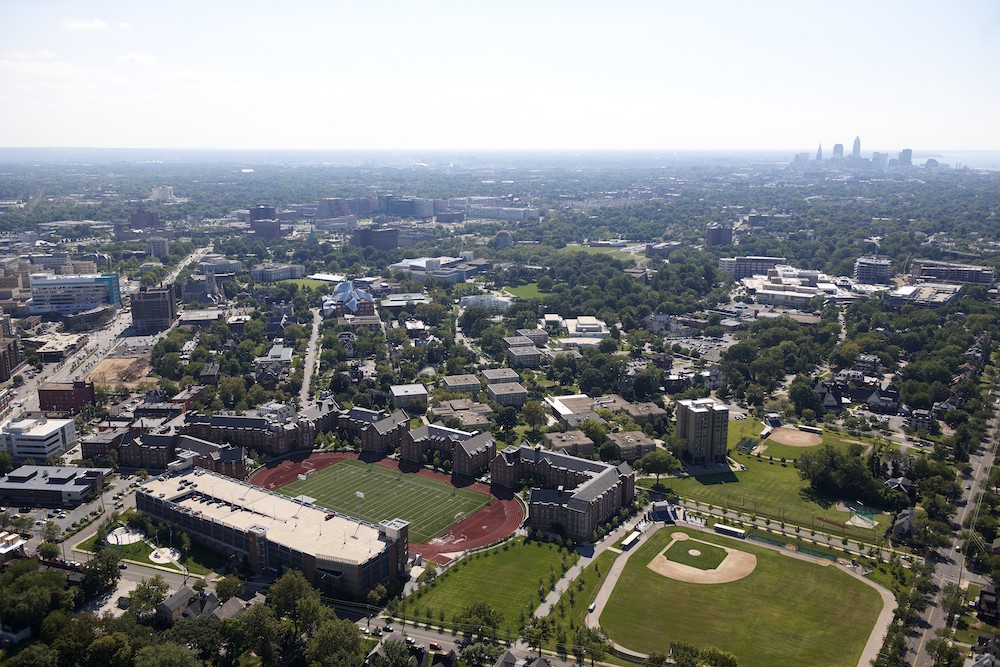The Ivy Scholars guide to Case Western Reserve University’s culture, admissions, and other essential information for prospective students and their families.
Location: Cleveland, Ohio
Mascot: Spartie the Spartan
Type: Private University
Population: 11,850 (5,300 undergrads)

Case Western Reserve University is known for its world class research. Its myriad focuses span from technology, engineering, and science to liberal arts; encompassing a variety of programs. Founded through the merging of Case Institute of Technology and Western Reserve University to create its current form, it now contains a concentration of educational, medical, and cultural institutions.

Year Founded: 1826
4 Year Graduation Rate: 65%
Gender Distribution: 55% male, 45% female
Acceptance Rate: 29%
Residency: 29% in state, 52% out of state, 19% international
Location Type: Urban
Schedule System: Semesters
Student/Faculty Ratio: 11:1
Average Class Size: 20
Demographics: 48% Caucasian, 15% Asian, 6% Black, 5% Hispanic, 4% Other
US News Rankings:
Independent Rankings:
Application Deadlines:
Notification Dates:
Acceptance Rates:
Average Applicant Pool: 29,000
Average Number of Applicants Accepted: 8,400
Average Number Enrolled: 1,400
Application Systems: Common App, Coalition App
Average GPA: 4.00 weighted
SAT Scores: 25th% – 1360, 75th% – 1480
ACT Scores: 25th% – 30, 75th% – 34
*Test mandatory. Writing sections are not required.
Demonstrated Interest:
Case Western does consider demonstrated interest.
Recommendation Letter Policies:
Applicants must submit three letters of recommendation, one from a counselor and two from teachers. The admissions team must be able to assess your academic capabilities and should therefore come from your most recent instructors in your proposed field of study.
Case Western Reserve University Essay Prompts:
Special Notes:
Admissions Criteria:
A student’s class rank, GPA, test scores, course rigor, and extracurriculars are the most important parts of an application. Also considered, but of secondary importance, are recommendations, interviews, demonstrated interest, character, essay, and abilities. The school may consider legacy status, ethnicity, and first-generation status.
Case Western wants incoming students to have taken classes that demonstrate their ability to do work at the college level. Doing well in a rigorous set of courses demonstrates that a student is ready for the challenges of college coursework. High scores on exams will also show your readiness, although they cannot make up for low grades or shirking on challenging classes.
Students who are looking to pursue a major in math or the sciences should take math and science courses all four years of high school, with at least two years of lab courses for the sciences. Students who want to study liberal arts should have four years of social studies, and three years of a foreign language.
Case Western does recruit athletes, but being recruited won’t provide much of a boost to your admissions chances.
What is Case Western Looking For?
Case Western is looking for passionate and involved students. They want students who have participated deeply in extracurriculars, and activities that set students apart from the crowd are more likely to shine. Students who participate in a more popular activity will have to work harder and achieve greater heights to stand out in comparison to the crowd.
Case Western has a number of current initiatives which inform its admissions process. They are trying to improve the school’s social impact, and are looking to increase student engagement in social impact projects. They are also trying to increase entrepreneurship and startups created by students. Finally, they are undertaking diversity initiatives to increase the number of historically disenfranchised or under-represented students on campus. This is both a focus on recruitment, and on retention, alongside an overall push to increase retention rates among students. The push is strongest in the STEM fields.
Case Western is very concerned with their yield numbers, and may waitlist or outright reject students if they believe those students are using them as a safety school, and intend to go elsewhere if they are admitted.
Finally, students who are admitted should align with the values of Case Western. This is harder to show, as there are no supplemental essays to show off in. Your main essay should not necessarily be targeted at Case, but should demonstrate your values.
Case Western Strategy:
Case Western’s desire to keep their yield high means that demonstrating interest, and clearly showing the Case is your top choice, will aid your application. While this may not make up for weakness, it can be the deciding factor in a tie. Applying ED or ED II can help you here, as a binding commitment to attend shows keen interest. ED is a better boost to admissions chances than ED II, but both are advantageous. Interviews are also a good way to demonstrate interest, and you should complete one if possible.
Showing a willingness to improve your community, and a desire to create positive change is important, as Case Western has a renewed commitment to positive social impact, and a desire to involve their student body in that quest. An activities list with prominent volunteering activities or social initiatives will show you are the kind of student they are looking for.
The school’s search for new entrepreneurial talent can also be shown through your activities list. Business internships, self-guided projects, and entrepreneurial exploits will all help you stand out, and show that you fit within the model the school is trying to build.
Students planning on studying art should definitely submit an optional arts supplement, in order to better showcase their talents and interests.
The school is trying to increase their retention rate overall, so demonstrating that you are capable of handling college-level courses with a high GPA and challenging course load is key. This will show the school that you are properly academically prepared to attend, and less likely to drop out. Demonstrating interest will also make them think you are less likely to transfer out, which is the other part of retention.
Schools:
Core Requirements:
Courses of Study:
AP Credit Policies:

Honors Programs:
Research Availability:
Study Abroad:
Business Options:
Pre-Med Options:
Pre-Law Options:
Computer Science Options:
Additional Specialty Programs:
Programs for High Schoolers:

School Motto: Light (Historical)
Mission and Values:
Housing System:
5 smaller residential communities offer a unique experience at Case for First Year students. The primary goal is to provide a foundation for future success by supporting the transition from high school to college. Second year students move to a different set of dorms featuring suite-style housing in the South Residential Village. Upperclassmen may move off, or move back to North Residential Village for either suite or traditional dormitory housing.
Housing Statistics:
Campus & Surrounding Area:
Transportation:
Traditions:
Student-Run Organizations:
Sports:
Greek Life:
Nearly 50% of students participate in Greek Life. The program consists of 17 Fraternities and 10 Sororities and have been in existence for the last 175 years.
Nightlife:

Yearly Cost of Attendance:
Scholarships:
85% of the students at Case Western receive grants which is 3% above the average given by other private educational institutions. Additionally, they meet 100% of demonstrated need for all admitted students. Finally, more that 80% of all students receive some form of financial aid.
All admitted freshman applicants are automatically considered for several scholarships, however they have several other scholarship competitions that can be applied for. Additional Aid Options include ROTC and Tuition Exchange programs.

Ivy Scholars is the leading educational consultant in Sugar Land, Texas, providing admissions coaching, test prep, and more to help students enroll at top tier schools.

Call us now: +1 (281) 215-5148
.


